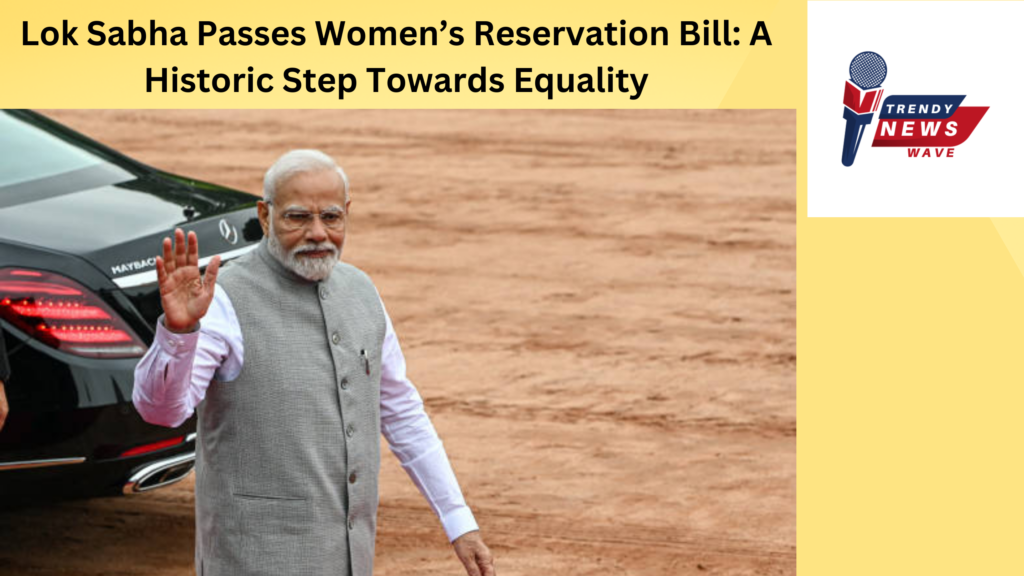
Lok Sabha Passes Nari Shakti Vandan Adhiniyam
In a momentous development, the Lok Sabha has passed the 128th Constitution Amendment Bill, known as the Nari Shakti Vandan Adhiniyam, with an overwhelming majority. This historic legislation is a significant stride towards providing one-third of seats for women in both the Lok Sabha and State Assemblies. Additionally, Home Minister Amit Shah has announced that the vital census and delimitation exercises, crucial for the implementation of this reservation, will take place following the 2024 elections.
This legislative milestone holds particular significance as it is the first bill to be passed by the Lok Sabha in the new Parliament building. As the bill seeks to amend the Constitution, it underwent a voting by division. Lok Sabha Speaker Om Birla declared that an astounding 454 members voted in favor of the bill, while only two members opposed it. The legislative procedure mandates that such a bill must be passed by a special majority, constituting two-thirds of the members present and voting.
Table of Contents
The Women’s Reservation Bill proposes to allocate one-third of seats for women from three categories of members in both the Lok Sabha and State Assemblies, including the Delhi Assembly: General, Schedule Caste, and Schedule Tribes. According to the provisions of the bill, its implementation will occur post the completion of the census and delimitation exercise. In effect, this pushes the realization of the bill’s provisions until at least 2029.
Addressing concerns regarding potential delays in the implementation of the bill, Home Minister Amit Shah stated, “The next government will conduct the census and the delimitation exercise immediately after the (general) election and set in motion the process to make reservation for women in Lok Sabha and State Assemblies a reality.” This statement implies that women’s reservation may become a reality after 2029, with the next general election due next year.
This legislative achievement represents the fifth attempt to enact a Women’s Reservation Bill. The previous four attempts faced obstacles, with the bill lapsing on each occasion. The bill was first introduced during the HD Deve Gowda government in 1996, followed by a second attempt under Atal Bihari Vajpayee’s government. In 2008, a bill was presented by the UPA, which also lapsed following the dissolution of the Lok Sabha at the time.
Expressing support for the Women’s Reservation Bill, Congress parliamentary party Chief Sonia Gandhi urged its immediate implementation and advocated for reservations for SC, ST, and OBC women following a caste census. Gandhi emphasized that any delay in implementing the reservation would constitute “gross injustice” to Indian women. She also acknowledged that the bill fulfills the dream of the late Rajiv Gandhi, while highlighting the importance of passing the bill without further delay.
also read
HDFC Bank Shares Witness 4% Decline: Is the Weak Run Set to Continue?
SJVN Partners with PFC to Secure Financing for Mega Projects Worth Rs 1.18 Lakh Crore
Moruniye song lyrics -Chandramukhi 2
In addition to Sonia Gandhi’s stance, Congress leader Rahul Gandhi stressed the need for the bill’s immediate implementation, contending that the legislation remains “incomplete” without provisions for OBC quotas. He vehemently advocated for a comprehensive caste census.
DMK leader Kanimozhi participated in the debate, asserting that the Women’s Reservation Bill signifies more than just reservation; it is an “act of removing bias and injustice.” She underscored that women aspire to be respected as equals. TMC MP Kakoli Ghosh Dastidar, representing West Bengal, alleged that the Modi government has engaged in a “sinister” move by linking the implementation of the women’s reservation bill with the conclusion of the next population census and delimitation exercise.
The passage of the Women’s Reservation Bill in the Lok Sabha signifies a historic moment in Indian legislative history, marking a significant step towards gender equality and women’s empowerment in the realm of politics and governance.

